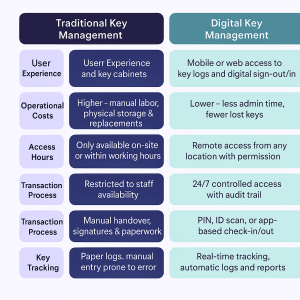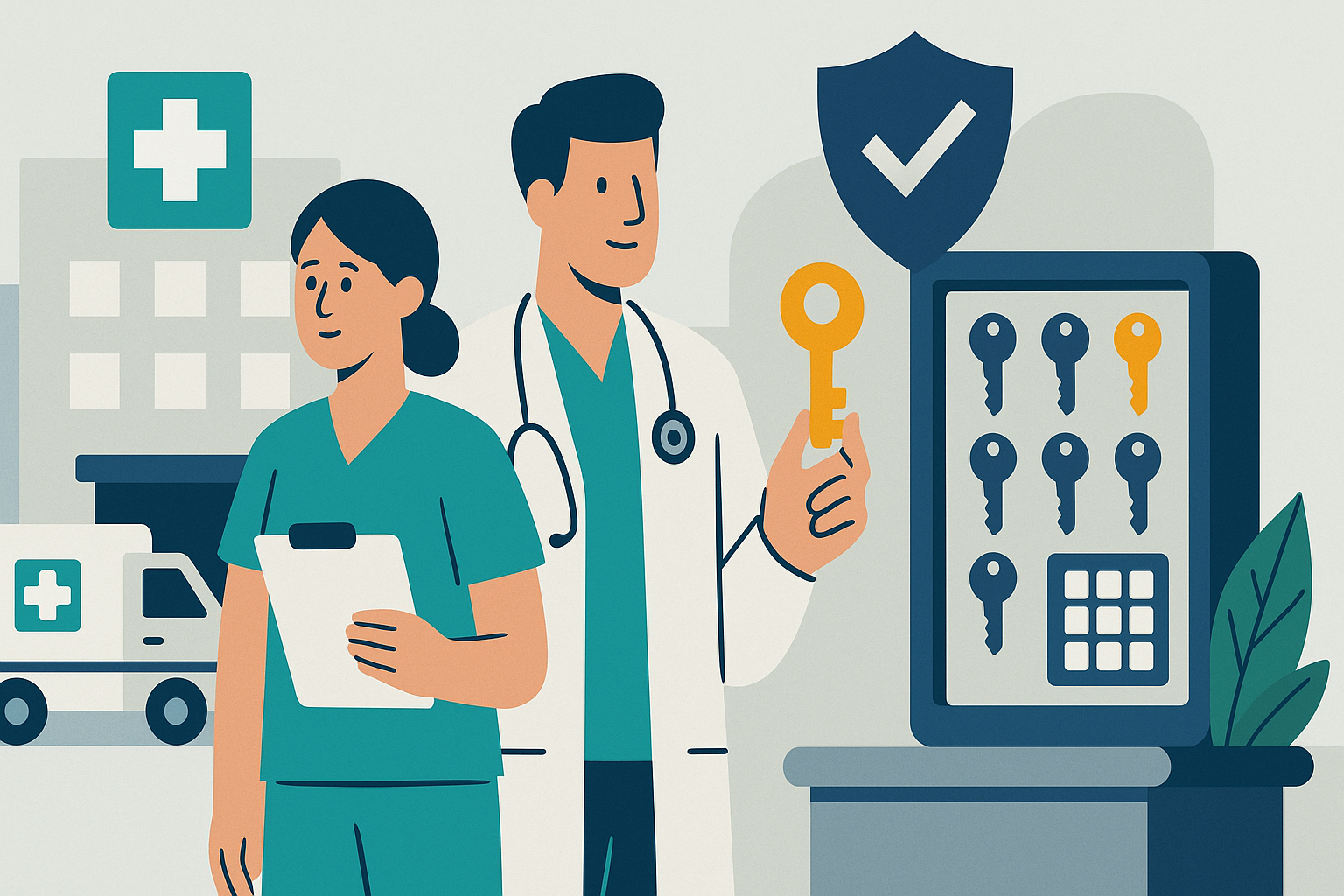In modern healthcare facilities, hospitals are navigating a complex security landscape where the lines between physical and digital key management systems are evolving. The critical question of traditional hospital key management vs. digital key management systems remains a vital decision for healthcare administrators and facility managers.
Today, in this comprehensive guide, we will bridge the divide by exploring both approaches’ key differences, advantages, and disadvantages.
What is Traditional Hospital Key Management?
Traditional hospital key management refers to the manual control and tracking of physical keys through conventional methods like key cabinets, logbooks, and physical sign-out procedures. It involves direct staff interaction and manual record-keeping for key accountability.
Here are some main characteristics of Traditional Hospital Key Management:
- Physical Key Storage:Requires secure key cabinets and designated storage areas, creating controlled access points for medical staff.
- Direct Staff Interaction:Allows face-to-face verification between healthcare personnel and security staff, fostering personalized key control service.
- Limited Geographical Reach:Customers are restricted to the store’s location, limiting the potential market size.
- Fixed Operational Hours:Bound by opening and closing times, potentially hindering customer convenience.
Advantages of Traditional Hospital Key Management
- Personalized Security Service:Allows for direct staff oversight and building trust with medical personnel during key exchanges.
- Immediate Key Access:Medical staff can receive keys immediately upon request, satisfying urgent healthcare access needs.
- Building Trust:Physical verification of personnel can establish trust and credibility in security protocols.
Disadvantages of Traditional Hospital Key Management
- High Administrative Costs:Staffing key desks, manual log maintenance, and physical storage can be significant operational burdens.
- Limited Access Points:Centralized key desk locations restrict medical staff accessibility throughout the healthcare facility.
- Operational Limitations:Fixed key desk hours can limit medical staff access during emergencies and off-hours.
What is Digital Hospital Key Management?
Digital hospital key management, utilizing software like Keyzi, refers to automated tracking and control of physical keys through digital platforms. It leverages QR codes, RFID technology, and mobile applications to conduct key transactions and offers real-time monitoring capabilities.
Some key characteristics of Digital Hospital Key Management (Keyzi):
- Digital Interface:Operates through Keyzi software and mobile applications, providing key access from multiple hospital locations with secure connectivity.
- Hospital-wide Access:The potential to provide key management access throughout the entire healthcare facility, significantly expanding accessibility for medical staff.
- 24/7 Availability:Provides continuous key access service, allowing medical staff to obtain keys during emergencies and off-hours conveniently.
- Automated Processes:Utilizes QR code scanning, digital signatures, and automated audit trails to streamline key management operations and increase security efficiency.
Advantages of Digital Hospital Key Management
- Hospital-wide Coverage:Can provide key access from multiple points throughout the facility, boosting operational efficiency for medical staff.
- Cost-Effective:Lower administrative overhead than traditional key desks, allowing more efficient resource allocation for patient care.
- Convenience:Enables medical staff to access keys anytime, anywhere within the hospital, catering to demanding healthcare schedules.
- Security Insights:Provides valuable audit trail data and analytics for better security decision-making, compliance reporting, and facility management optimization.
Disadvantages of Digital Hospital Key Management
- Security Concerns:Risks of cyber-attacks and data breaches require robust security measures.
- Reduced Personal Oversight:Automated key management processes may reduce direct staff supervision, potentially limiting immediate security assessment.
- Training Requirements: Medical staff require training on digital systems and QR code processes, potentially creating initial learning curves.
Traditional vs. Digital Hospital Key Management

Future Trends in Hospital Key Management
The future of hospital key management is likely to be a hybrid model that merges the strengths of both traditional and digital key management systems. Here are some emerging trends to consider for healthcare facilities:
- Smart Key Technologies:Traditional key cabinets are evolving to offer smart lockers and RFID-enabled storage, providing interactive key management experiences and fostering enhanced security protocols.
- Integrated Healthcare Systems:Seamlessly connecting digital key management with hospital information systems provides a unified security experience, regardless of where medical staff access keys.
- AI and Predictive Analytics:Digital key management systems will leverage artificial intelligence for predictive key usage patterns and automated security risk assessment.
- IoT Integration:Internet of Things (IoT) sensors will allow real-time monitoring of key locations and usage patterns, enabling hospitals to track key movements throughout the facility and enhancing the digital key management experience with precise location data.
- Blockchain for Enhanced Security:Blockchain technology offers significant potential for hospital key management systems by providing immutable audit trails and enhanced security transparency for key access transactions, ensuring complete accountability in healthcare facilities.
FAQ on Hospital Key Management Systems
What is the difference between traditional and digital hospital key management?
The difference between traditional and digital hospital key management lies in their operational methods. Traditional hospital key management involves manual key tracking conducted through physical key cabinets and paper logbooks, while digital key management refers to automated key tracking and control using software like Keyzi with QR codes and digital audit trails.
Can hospitals integrate both traditional and digital key management?
Yes, hospitals can integrate both traditional and digital key management approaches to leverage their strengths. This hybrid strategy can enhance medical staff satisfaction, improve security compliance, and expand key access throughout the healthcare facility.
Conclusion
Both traditional and digital hospital key management systems have their unique strengths and challenges. While traditional key management offers direct staff oversight and immediate physical key access, digital key management provides convenience, hospital-wide accessibility, and enhanced security audit trails. Healthcare facilities must evaluate their security requirements and resources to determine the most suitable approach or consider integrating both systems to maximize their operational potential.
By understanding these differences and implementing effective strategies, healthcare facilities can enhance their security protocols and operational efficiency. Whether you choose the personal oversight of traditional key management or the advanced capabilities of digital key management systems like Keyzi, the key lies in delivering secure, efficient, and accountable key access to your medical staff.
Keyzi Hospital Key Management simplifies the process by providing a comprehensive platform designed explicitly for healthcare facilities. Cost-effective compared to other options, Keyzi empowers hospitals to establish robust security protocols with built-in features for QR code tracking, digital signatures, and automated audit trails. The platform’s user-friendly design ensures a smooth experience for medical staff and security personnel. Whether you’re a large hospital looking to digitize your key operations or smaller clinic just getting started, Keyzi Key Management Software equips healthcare facilities with the tools and resources to enhance security and operational efficiency.


